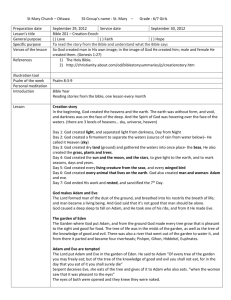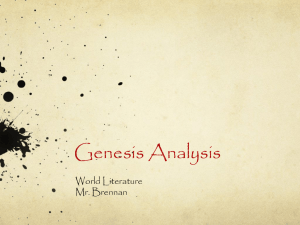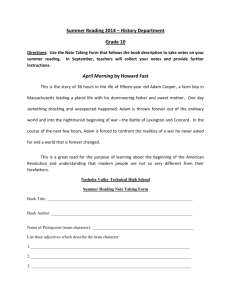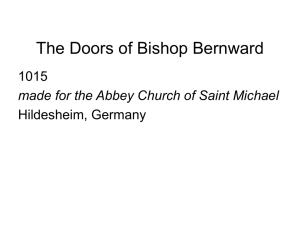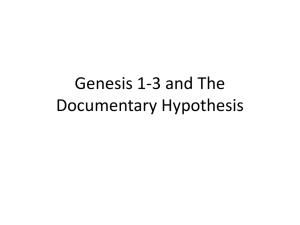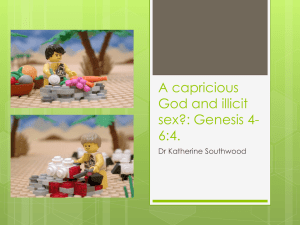Did a Pre-Adamic Race Exist on Earth?
advertisement
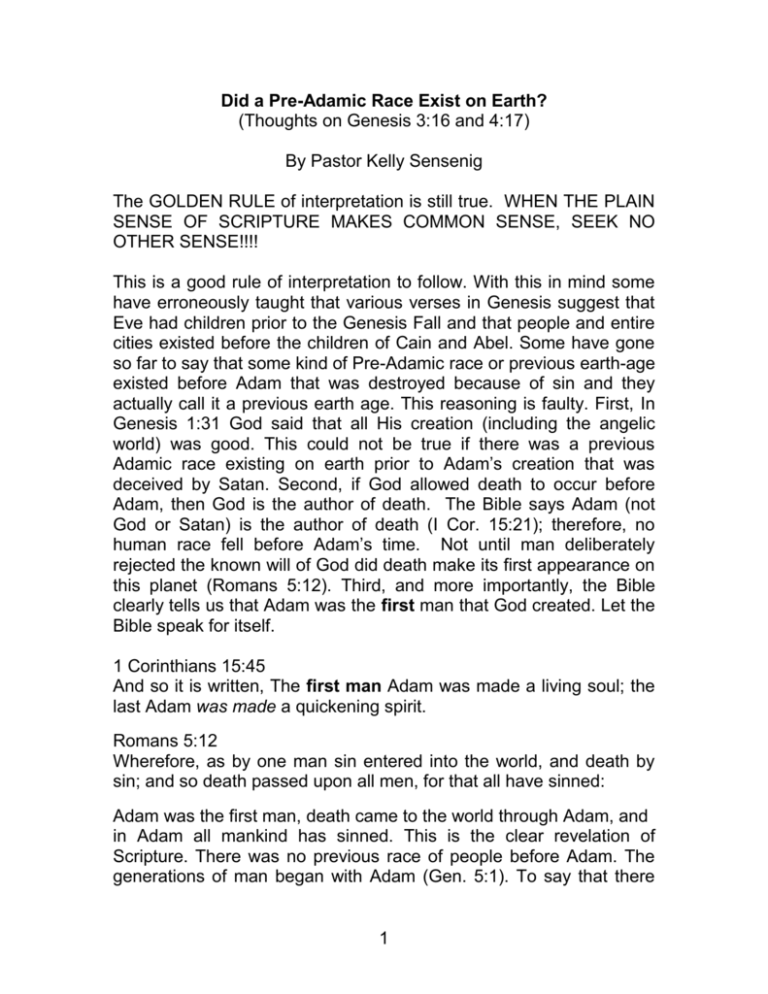
Did a Pre-Adamic Race Exist on Earth? (Thoughts on Genesis 3:16 and 4:17) By Pastor Kelly Sensenig The GOLDEN RULE of interpretation is still true. WHEN THE PLAIN SENSE OF SCRIPTURE MAKES COMMON SENSE, SEEK NO OTHER SENSE!!!! This is a good rule of interpretation to follow. With this in mind some have erroneously taught that various verses in Genesis suggest that Eve had children prior to the Genesis Fall and that people and entire cities existed before the children of Cain and Abel. Some have gone so far to say that some kind of Pre-Adamic race or previous earth-age existed before Adam that was destroyed because of sin and they actually call it a previous earth age. This reasoning is faulty. First, In Genesis 1:31 God said that all His creation (including the angelic world) was good. This could not be true if there was a previous Adamic race existing on earth prior to Adam’s creation that was deceived by Satan. Second, if God allowed death to occur before Adam, then God is the author of death. The Bible says Adam (not God or Satan) is the author of death (I Cor. 15:21); therefore, no human race fell before Adam’s time. Not until man deliberately rejected the known will of God did death make its first appearance on this planet (Romans 5:12). Third, and more importantly, the Bible clearly tells us that Adam was the first man that God created. Let the Bible speak for itself. 1 Corinthians 15:45 And so it is written, The first man Adam was made a living soul; the last Adam was made a quickening spirit. Romans 5:12 Wherefore, as by one man sin entered into the world, and death by sin; and so death passed upon all men, for that all have sinned: Adam was the first man, death came to the world through Adam, and in Adam all mankind has sinned. This is the clear revelation of Scripture. There was no previous race of people before Adam. The generations of man began with Adam (Gen. 5:1). To say that there 1 were people existing on earth before Adam is a weird and wacky conclusion that has no Scriptural base. To say he was the first man after a prior race of millions of men would be severe eisegesis (reading into the Scriptures something that is not there). But what about Adam and Eve bearing children before Cain and Abel? Is there any logic to this reasoning? Some claim that Genesis 3:16 alludes to the fact that Eve had previous children before Cain and Abel. Genesis 3:16 says, “Unto the woman he said, I will greatly multiply thy sorrow and thy conception; in sorrow thou shalt bring forth children; and thy desire shall be to thy husband, and he shall rule over thee.” The point is made this way. Since God told Eve that He would greatly multiply the woman’s sorrow and her conception in sorrow that there had to be children before the Fall and before Cain and Abel. This is because God said He was multiplying (Hebrew “rabah” - increasing greatly or exceedingly) the woman’s sorrow. You can’t multiply something that did not previously exist. Several observations can be made about this faulty interpretation. First, God gave the original command to replenish the earth with offspring back in Genesis 1:28. This verse is a summary of God’s original intent for mankind while He lived in a state of innocence. Naturally, since the Fall took place, God was now adding a new feature or dimension to His original intention and plan for child birth. The idea of multiplying has to do with changing God’s original intention (pain free child birth in a state of innocence) to another plan of childbirth that now involves pain and sorrow, due to the entrance of sin in the human race. It has nothing to do with making something worse than it was before. It’s understood that before Eve had children the curse came upon mankind. A logical and factual reading of the Bible places conception and childbirth after the Fall (Gen. 4:1-2). No one knows how long or short the state of innocence was for Adam and Eve. The Bible simply states that after the Fall children were born. We must allow the Bible to speak for itself on this matter. Second, God in this statement was simply telling the woman that He would greatly multiply her suffering in general, and more particularly 2 that of her childbearing. Her pains would exceed that of men and particularly during the period of childbearing. And all the ladies said, “Amen!” In a general way, women would experience greater suffering than men (multiplied suffering) and this would be seen when she brings forth children. The idea of multiplying may simply be a comparison between the woman’s suffering and the man’s level of suffering. The woman’s suffering would be greatly multiplied in comparison to the mans suffering, childbirth being a prime example. Her multiplied suffering over the man, especially in childbirth, is a constant reminder that a woman gave birth to sin in the human race and passes it on to all her children. Notice, she can be delivered from this curse to some degree by raising godly children, as indicated in 1 Tim. 2:15. Third, to interpret the statement (“greatly multiply thy sorrow and conception”) as meaning that Eve would continue to bear children as she did before, but with greater pain, would suggest that there must have been pain in childbirth prior to the Genesis Fall. This is erroneous. The Bible clearly says that pain and death go together and were associated with the Fall (Gen. 3:14-19). They had no existence prior to the Fall. The Bible indicates that nature’s curse (“groaning and travailing in pain”) is a result of the Edenic curse, which came after Adam’s fall (see Romans 8:20-22). Fourth, the understanding of Genesis 3:14-19 is that none of the curses mentioned by God occurred before the Fall. To say that they did occur prior to the Fall in some form or other is illogical. If pain occurred before the Fall in childbirth, to some degree, then to be honest with the text, you must also say that Adam and Eve faced the battle of the sexes to some degree before the Fall (Gen. 3:16), the ground was also cursed to some degree before the Fall (Gen. 3:1718), man had to work vigorously to some degree before the Fall to make ends meet, and that death to some degree existed before the Fall (Gen. 3:19). Furthermore, sin must have then existed to some degree before the Fall. All of this is untrue (Rom. 5:12). Interpreting the phrase “multiplying thy sorrow” as a greater sorrow that previously existed opens up a can of interpretive worms. If you interpret one part of the curse as being greater in intensity and existing prior to the Fall, then you must interpret them all in the same way. 3 Fifth, to suggest that there were children born to Adam and Eve prior to the Fall means that there were sinless babies and children. This too is a faulty conclusion. David declared that children are born in sin (Psalm 51:5). The Bible never talks about a sinless race of people in some kind of prior earth age. To say that there was such a race is pure conjecture. The only race that existed was the one race that existed before the Genesis Flood (2 Pet. 3:6) Sixth, the Scripture in a clear and understandable fashion suggests that Cain was the first son born to Eve (Gen. 4:1). Eve in this verse said that she had “gotten a man from the LORD” (not another man or the second, third, fourth, or tenth man). Let’s believe what the Bible simply states and says. Cain was the first son. There were no sons or children prior to Cain. Furthermore, Scripture speaks of the three sons of Adam and Eve (Cain, Abel, and Seth – see Gen. 4:25) – not the three hundred sons or children that lived before them. Seventh, if there were other children born to Adam and Eve before Cain and Abel then why doesn’t Scripture (the final source of our authority) record this anywhere within its pages? Why would God hide this from us? What the Bible does tell us is that Adam and Eve were the first human parents of Cain and Abel. To make assumptions otherwise by reading human reasoning into texts causes us to huckster the intended meaning of the Bible (2 Cor. 2:17 – “For we are not as many, which corrupt the word of God”). It is also suggested by some that there must have been people living before Cain because of the mention of people living in a city. But let’s read what the Bible actually says. What saith the Scripture (Rom. 4:3)? Genesis 4:17 And Cain knew his wife; and she conceived, and bare Enoch: and he builded a city, and called the name of the city, after the name of his son, Enoch. The Bible says that Cain was the progenitor of the city as he tried to reverse the curse of wandering that God had placed on him. He brought the city into existence or the first civilization that perished in 4 the judgment of the Genesis Flood. This civilization marked a civilization that wanted to exist apart from God. Cain said in Genesis 4:14-15: Behold, thou hast driven me out this day from the face of the earth; and from thy face shall I be hid; and I shall be a fugitive and a vagabond in the earth; and it shall come to pass, that every one that findeth me shall slay me. But God replied: And the LORD said unto him, Therefore whosoever slayeth Cain, vengeance shall be taken on him sevenfold. And the LORD set a mark upon Cain, lest any finding him should kill him. Some suggest that since there were people living on earth that could find Cain that there must have been a race of people or children born to Adam and Eve prior to Cain. But once again Scripture debunks this idea (1 Cor. 15:45). Adam was the first man. Cain was simply recognizing that as the earth became populated (Gen. 6:1) he would become a marked man and a moving target for causing such problems in the world. But God made sure that this would not be the case by protecting Cain with some mark or sign that would become a deterrent to others and keep them from killing him. The same mark that saved him was the lifelong sign of his shame. In any event, to claim by this statement (“every one that findeth me shall slay me”) that there was a race of people existing on earth before Cain, or that Adam and Eve had children prior to Cain, is to read into the Scriptures one’s own fantasies. Cain simply was recognizing that as the earth rapidly expands in population he would need God’s protection. In conclusion, to use hypothetical reasoning with the statements that are presented in Genesis 3:16 and 4:15-17, without studying the context or entire Biblical record on creation, causes one to arrive at anti-Biblical conclusions. The natural reading of Genesis records accurate truth. So remember this old interpretive saying: The main things are the plain things, and the plain things are the main things! 5
